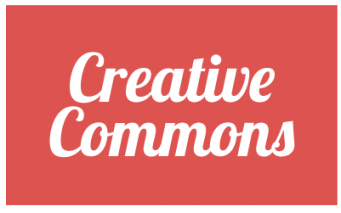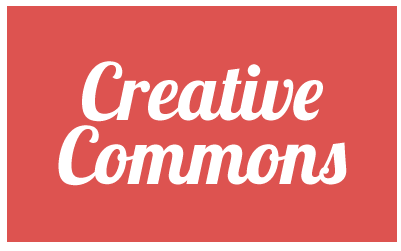




The Creative Commons, which is always referred to as CC, is an online platform which enables users to share creativity and knowledge with each other. It is a place where people can find, use, remix and edit creative work from around the world, and not fear being prosecuted by copyright laws for using, blogging or remixing, already existing materials. It's a safe haven for people that participate in the remix culture, but it is also a place where creatives can share their work, so that other people from around the world can create something new based on their original work.
The Creative Commons was founded by Lawrence Lessig (More information about Lawrence Lessig can be found by clicking on the link above) as a way of not only protecting the people who remix work they find online, but to also protect the people creating the original material. The Creative Commons is an easy to use, set of licenses that provide creatives a platform to share their work and control the way in which their work is used or recreated. What I mean by this is that when someone uploads material onto the internet, they simply go to the CC website and choose a license. Once they have chosen their preferred license, they are given a HTML to apply to the site that their work is on.

CLICK HERE TO VISIT THE CREATIVE COMMONS WEBSITE
As I mentioned before, the aim of the Creative Commons is to make licensing your creative material, easy, straightforward and painless. When someone uses their website to acquire a Creative Commons license, they are provided with a number of options. The options provide them with a number of ways in which they would like their work to be available to others. The options vary, and can make a drastic difference in the way in which your work is seen and used by people from around the world.
Below this paragraph are the options given to users. I have also provided the symbols for all of the options.
Attribution
NonCommercial
NoDerivatives
ShareAlike
All CC licenses require that others who use your work in any way must give you credit the way you request, but not in a way that suggests you endorse them or their use. If they want to use your work without giving you credit or for endorsement purposes, they must get your permission.
You let others copy, distribute, display, perform, and modify your work, as long as they distribute any modified work on the same terms. If they want to distribute modified works under other terms, they must get your permission first.
You let others copy, distribute, display and perform only original copies of your work. If they want to modify your work, they must get your permission first.
You let others copy, distribute, display, perform, and modify your work, as long as they distribute any modified work on the same terms. If they want to distribute modified work under other terms, they must get your permission first.
When someone licenses their work and selects 'Attribution', which is represented by the symbol on the right, they are stating that they give people the permission to use your work, but must give you credit when doing so. They credit the owner of the original work by clearly placing your name, website etc.
You let others copy, distribute, display, perform, and modify your work, as long as they distribute any modified work on the same terms. If they want to distribute modified works under other terms, they must get your permission first.
You let others copy, distribute, display and perform only original copies of your work. If they want to modify your work, they must get your permission first.
You let others copy, distribute, display, perform, and modify your work, as long as they distribute any modified work on the same terms. If they want to distribute modified work under other terms, they must get your permission first.
The Licenses
Below are the different types of licenses you can get from the Creative Commons. Based on the options above, a user can easily choose how exactly they want to share their material with other people online. This is very important for both the owner of the work and any one else who likes the work and may want to use it for something else, because it sets clear guidelines as to what is ok and what isn't.
Attribution
Attribution - ShareAlike
Attribution - NoDerivatives
Attribution - NonCommercial
Attribution - NonCommercial - ShareAlike
Attribution - NonCommercial - NoDerivatives
Used by Wikipedia
Many people are familiar with the term 'Copyright', especially in recent times, where people are fearful and unsure of what copyright actually is and means. However, there is also another term used called 'Copyleft'. Copyleft is a play on the word copyright to describe the practice of using copyright law to offer the right to distribute copies and modified versions of a work and requiring that the same rights be preserved in the new work created based on the original work. In other words, it is a way where people can share their work for free, but make sure that any work created by other people, based on their work has no option but to make their work available in the same way.